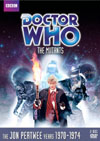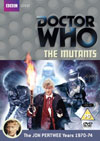DVD Extras include:
An added bonus is that they have a clearly defined mission straight from the beginning - to deliver a Time Lord message capsule to someone at the planet Solos. What is a little strange is that the Time Lords know so much about the challenge facing Solos at this time, and wanting the Doctor to do something about it, they tell him precisely diddly-squat before sending him there. Good thing he actually recognized the message box for what it was, or he might have been really confused. Anyway, the mysteries surrounding first the box and later its contents fuel much of the interest in watching this story unfold, and so it turns out to be a useful plot device in the end.
Transmat DesignTransmat returns for the first time since "The Seeds of Death" (story no. 48), and proves that it still has plenty of teething trouble. Nothing seems to work right with it. Trick dissolves would be easy enough, but the set designer seems to want to steal the thunder with rotating doors. Then video effects are used to paint the booth windows blue, whilst the footage of empty booths that would make the process easily understandable is absent 90% of the time.The skybase orbiting Solos has some innovative interior sets to be sure - the first use of the triangular wall pattern for example, but what really takes away from the transmat process is the fact that the sets for the surface terminal on Solos are EXACTLY the same, even down to the lighting, making it appear that people using the transmat have not gone anywhere at all. Add to this the lack of any exterior shots of the surface terminal, and the lack of any direct juxtaposition of scenes of people moving from inside the terminal to outside or vice-versa (until about episode 5), and this important setting is just not very well manifested on the screen. It becomes a huge waxy ball of "visual illiteracy", as animator/director Terry Gilliam might put it, relying on dialogue alone to convey the idea.
Music for Brownian MotionTristram Cary does his worst Doctor Who work here in this story. Like Malcolm Clarke's work in the previous story, it is totally weird and way too random, missing the mood of the story most of the time. But unlike Clarke's work, it doesn't really have many truly outstanding moments of excellence either. In fact, Cary's random sound often seems to be attempting to murder the dialogue in scene after scene, as though, in its insanity, it would love to suffocate the words under a wash of sound, jumping from one tone randomly to the next as though bored or frustrated when the actors keep on talking. This is the ultimate no-no in incidental music.A lot can be learned from the way that the BBC Radiophonic Workshop composed music for the show in the early eighties: they copied the dialogue from the video footage onto their multi-track audio tapes as a synchronization guide, where it effectively became part of the musical composition itself. This results in harmony such as when a particularly loud piece of music backing a sudden sprint for the actors near the end of "Mawdryn Undead" Part One pauses politely to let Janet Fielding blurt out her line in perfect clarity, before resuming its own staccato pounding. Not a great piece of music, but at least it was courteous. Harmony between dialogue and music make better cinema. At least Clarke's music was trying to tell the narrative of the story in its own way; Cary's seems to be completely off on its own wailing tangent.
Writing HighpointsEven as technical problems mount with this production, the story itself appeals so greatly to my own personal tastes that I am still prepared to cite it as my personal favourite from season nine..... The writers manage to do justice to issues of racial segregation and interference with the environment (shades of "The Green Death"), earning them a huge plus in my book. Baker and Martin also tend to cater to the spectacle of special effects, and before the production is done it brings us some very nice model work, lots of multi-coloured eye-candy video effects for various particle reversal effects and for Super-Ky, and some very funky sequences in the radiation cave. There are a number of great performances in this one as well, including Paul Whitsun-Jones as the Marshal, George Pravda as Professor Jaeger, and Geoffrey Palmer playing the Administrator: yet another government official as he played in "The Silurians" (story no. 52), only in space and in the future this time. Christopher Coll does much better here as Stubbs than he did as Phipps in "The Seeds of Death", and even if Rick James' Cotton is a little different, he's okay in my book. John Hollis makes a wonderful Sondergaard. The Overlord guard extras stand out as being really awkward most of the time though.Baker and Martin also put the science back in science fiction by setting so many scenes in laboratories, where the Doctor and other scientists can grapple with new concepts and explore them with the viewers. This story also has the best alien planet setting in the entire Jon Pertwee era, where writing balances scientific ideas with the creation of a unique culture and mythology worthy of six episodes of exploration, and all this is quite effectively and atmospherically realized within the limited resources of 1970's television. Solos is an awesome planet! It is additionally interesting for those comparing this to new millennium Doctor Who, to see how the script frames the Marshal's later suggestion to rename the planet "New Earth". This is clearly an insult to the Solosians, their culture, and their claim to their own planet, a suggestion whose plans the Doctor must foil. Solos is unique. It deserves to hold its own title. Some of the ideas, devices, and visuals easily suggest a sense of spirituality towards the ending, but I think we should exercise caution to not read too much into some of the things we see. The true test of spirituality is in the philosophy behind the actions of the characters, and we do get some disappointing violence wrapped up in a glowing cloak that perhaps raises higher expectations. As an act of defense, it is reasonable and has certainly been sufficiently motivated. But one is left wondering what other possibilities might have been even more ideal.... But speaking of the philosophies behind the actions of the characters, it must be noted that of all the stories of season nine, "The Mutants" presents the Doctor's character at its best. While "The Curse of Peladon" (story no. 61) is perhaps equally flawless in this regard, the Doctor is a bit busier as a scientific problem solver in "The Mutants", in addition to his on-target social work. Unlike in "The Sea Devils" (the previous story), the Doctor wastes no time making unfulfilled promises of peace while acting in a manner completely opposite to his stated philosophy. Here in "The Mutants" he is simply seen to collect new friends and allies in his wake as he goes along, until local former enemies find themselves working together and helping each other. This is an interesting contrast to the main antagonist of the piece, who is doing the opposite and setting former friends and allies at each other's throats for his own personal gain. And the Doctor is also seen to tackle a wide variety of problems and come out victorious, something the next story has great difficulty in arranging. All this gives "The Mutants" an important and most impressive boost in the season's rankings.
International Titles:Deutsch: "Die Mutanten"Magyar: "A mutánsok"Français: (Les Mutants)Русский: "Мутанты"This story has become available on DVD and VHS video. Click on the Amazon symbol for the location nearest you for pricing and availability:
Comments on this article are welcome. You may contact the author from this page:
|









